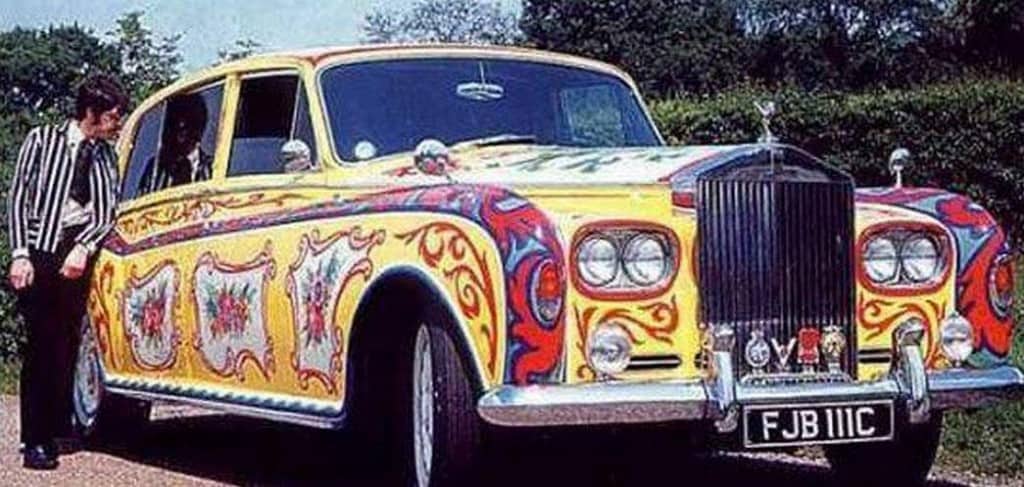Keener Weekend – 04/27/13
Geoff Larcom’s sister dated Iggy way before he was famous. From the WSJ, how “Reach Out and I’ll Be There” came to be.
If you loved Keener, you might have listened to WABC on the skywaves after dark. Here’s a montage of their PAMS/JAM jingles over the years.
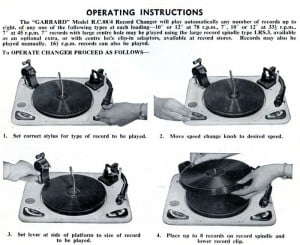 We’re old enough to remember how to use a record player. But for those who never had one.. Here are some instructions.
We’re old enough to remember how to use a record player. But for those who never had one.. Here are some instructions.
Keener trivia: Remember Tim Tam and the Turn-Ons? They hit twice on the WKNR Music Guide with “Wait a Minute” and “Cheryl Ann”. But you might not know that there were once apartment buildings in Allen Park named “Tim Tam” and “Turn Ons”.
Greenfield Village (The Henry Ford) is open.. so it must be Spring.
Phil Collins and Martha Reeves on “Heatwave”. Shouts to Susan Whitall.
God Speed Richie Havens
And some cool Keener images backing up Reunion’s 1974 classic.
Keener Weekend 4/13/13
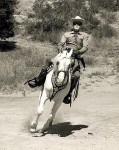 How did you spend your Saturday mornings growing up in the Keener era? For many of us, weekend TV was allowed. Roy Rodgers, Superman and the Lone Ranger mixed with cocoa puffs, sugar jets or sugar pops. (remember when “sugar” was a word that the cereal people put into the names of their products?)
How did you spend your Saturday mornings growing up in the Keener era? For many of us, weekend TV was allowed. Roy Rodgers, Superman and the Lone Ranger mixed with cocoa puffs, sugar jets or sugar pops. (remember when “sugar” was a word that the cereal people put into the names of their products?)
Keener listeners always knew it was Saturday because that’s when the mellifluous voice of Paul Cannon was heard on the radio. Behind the scenes, Paul served as WKNR Music Director during much of Keener’s prime. Record reps remember the egg timer that Paul kept on his desk. When the sand ran out, that was the abrupt end of their appointment.
Here’s a piece of WKNR Music Guide Trivia. There was only one song with “Saturday” in the title that ever charted on Keener: The Drifters’ Saturday Night at the Movies made the survey in 1964.
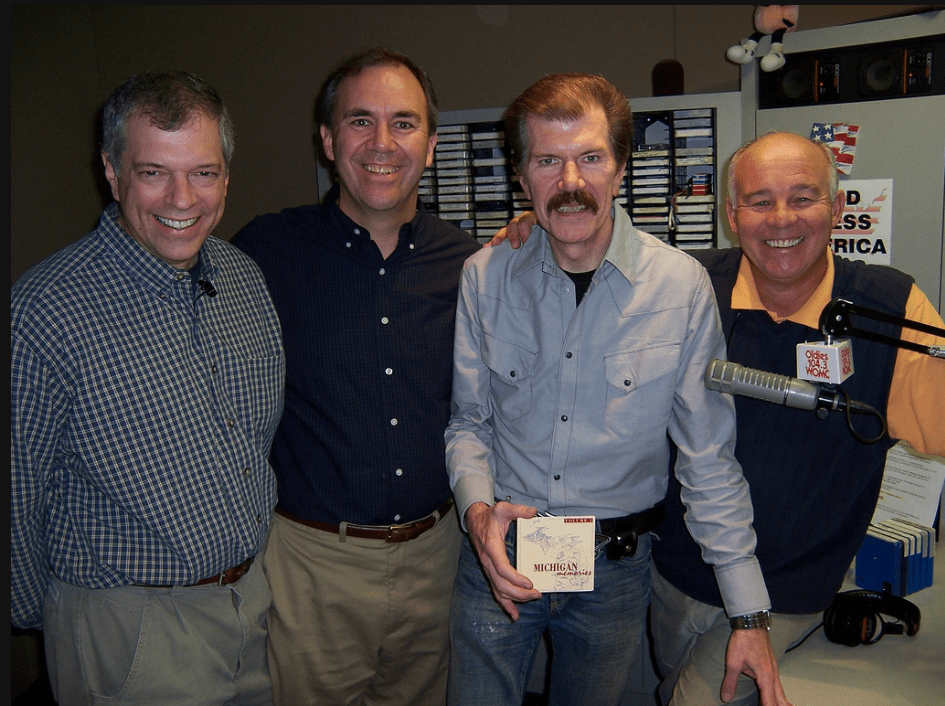 Here’s an historic shot from one of the famous Detroit Radio Reunions. From left to right: Scott Westerman, Curator of Keener13.com and executive producer of WKNR’s two Woodward Dream Cruise Weekend broadcasts. Steve Schram, on-air talent during Keener’s brief return in the 80s and market general manager of the cluster that included Keener’s successor, WNIC. Steve’s dream came true when the WKNR-FM property again became the number one station in Detroit. New York radio legend, Pat St. John, perhaps the youngest DJ to ever have a full time shift on Keener during it’s final prime. And Bob Berry, who’s most notable Michigan radio credits included WVIC, CKLW, and WDRQ. All four were voices heard on WKNR at one time or another. Where are they now? Bob and Pat are celebrating 40 decades in broadcasting and are still on the air. Steve is the director of Michigan Radio (WUOM, WVGR, WFUM, MichiganRadio.org), one of the nation’s premiere public radio clusters. Scott is Executive Director of the Michigan State University Alumni Association, an institution that spawned some great radio talent, including Chicago institution, John “Records” Landecker.
Here’s an historic shot from one of the famous Detroit Radio Reunions. From left to right: Scott Westerman, Curator of Keener13.com and executive producer of WKNR’s two Woodward Dream Cruise Weekend broadcasts. Steve Schram, on-air talent during Keener’s brief return in the 80s and market general manager of the cluster that included Keener’s successor, WNIC. Steve’s dream came true when the WKNR-FM property again became the number one station in Detroit. New York radio legend, Pat St. John, perhaps the youngest DJ to ever have a full time shift on Keener during it’s final prime. And Bob Berry, who’s most notable Michigan radio credits included WVIC, CKLW, and WDRQ. All four were voices heard on WKNR at one time or another. Where are they now? Bob and Pat are celebrating 40 decades in broadcasting and are still on the air. Steve is the director of Michigan Radio (WUOM, WVGR, WFUM, MichiganRadio.org), one of the nation’s premiere public radio clusters. Scott is Executive Director of the Michigan State University Alumni Association, an institution that spawned some great radio talent, including Chicago institution, John “Records” Landecker.
This week in KeenerLand
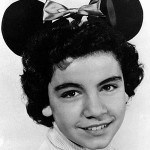 We’re remembering Annette Funicello this week. You might not know that our favorite Mousekateer sang what became one of the most recognizable TV theme songs of all time Here’s a classic Keener13 Podcast from January of 2005 with the back story and some rare audio clips from Johnny Carson’s Tonight Show, juxtaposed with Harry Shearer’s dead on imitation during his time with The Credibility Gap.
We’re remembering Annette Funicello this week. You might not know that our favorite Mousekateer sang what became one of the most recognizable TV theme songs of all time Here’s a classic Keener13 Podcast from January of 2005 with the back story and some rare audio clips from Johnny Carson’s Tonight Show, juxtaposed with Harry Shearer’s dead on imitation during his time with The Credibility Gap.
Remember the classic Faygo commercials of the early 70s? What series did the actor who played the frustrated shop keeper star in during radio’s golden age?
Another classic from 1965. Former Limeliters front man Glenn Yarbrough on the Danny Kaye show singing his Keener hit, “Baby the Rain Must Fall”. What may be lesser known is that the song is also the title of a 1965 film starring Steve McQueen and Lee Remick.
http://www.youtube.com/watch?v=1o_MtK5QVVk
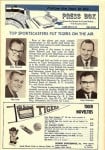 Did you know… That the Tigers flagship station used to be 1310? Back before Keener, WKMH was the Detroit home for Tiger Baseball play by play with Ernie Harwell and George Kell at the microphone. Fred Knorr, the managing partner of the group that owned WKMH, WKHM in Jackson and WKNX in Flint, was part owner of the Tigers and was heavily involved with the team until his untimely death. After the Bengals moved to WJR, George Kell turned his talents to television, providing play-by-play there for many years. But the Keener generation, Ernie Harwell will always be the voice of summerHere’s the page from the 1968 Tiger yearbook featuring the names we remember best. (Click the picture to see a full size version.) Remember the biblical quote that Ernie would always read at the start of each season?
Did you know… That the Tigers flagship station used to be 1310? Back before Keener, WKMH was the Detroit home for Tiger Baseball play by play with Ernie Harwell and George Kell at the microphone. Fred Knorr, the managing partner of the group that owned WKMH, WKHM in Jackson and WKNX in Flint, was part owner of the Tigers and was heavily involved with the team until his untimely death. After the Bengals moved to WJR, George Kell turned his talents to television, providing play-by-play there for many years. But the Keener generation, Ernie Harwell will always be the voice of summerHere’s the page from the 1968 Tiger yearbook featuring the names we remember best. (Click the picture to see a full size version.) Remember the biblical quote that Ernie would always read at the start of each season?
“For, lo, the winter is past,
The rain is over and gone;
The flowers appear on the earth;
The time of the singing of birds is come,
And the voice of the turtle is heard in our land.”
– Ernie Harwell quoting the Bible’s Song of Solomon 2:11-12
With shouts to Facebook’s Rock and Roll Orphanage, here’s a shot of of John Lennon’s 65 Rolls Royce Phantom V. Wonder if he did the spray work himself?
Marvin Gaye and the Funk Brothers, Live
.. on what would have been his 74th birthday.
http://www.youtube.com/watch?v=hFcY_ArJ9X8
Happy Birthday from the Keener13.com team!
Making Radio Matter
By Fred Jacobs
So it turns out I’ve known Scott Westerman about as long as I’ve known anyone in radio. We met at Michigan State back in the ‘70s, but Scott was already a radio veteran having started out at WPAG/Ann Arbor at the ripe old age of 14. By the time he earned a Telecom degree at MSU, Scott was doing mornings at WVIC/Lansing. While radio was in his blood, Scott ended up becoming a cable television magnate, founded the World Beacon shortwave radio network, started up a record label, and created the popular keener13.com tribute site modeled after his beloved WKNR/Detroit.
Today, Scott is head of the MSU Alumni Association, and lives to put together smart Spartans of yesterday and today for the betterment of all. I have seldom come across media professionals as passionate as Scott.
Last week, I posted a blog – “How Can I Matter More?” – and it resonated with Scott. His blog comment was too good to become a post of its own. It covers a lot of ground, but harkens back to the days when jocks simply mattered more. Is that about the nature of those times or where those personalities more tapped into their listener communities than many of the jocks of today?
Scott Westerman and Steve Schram founded Keener13.com in 2004.
Please enjoy some great storytelling, schooling, and food for thought from one of the best, Scott Westerman.
 Last week I had the rare opportunity to dine with Bob Green, the legendary WKNR air personality and program director. We found a quiet corner in a Houston restaurant and caught up on each other’s families and adventures during the last year.
Last week I had the rare opportunity to dine with Bob Green, the legendary WKNR air personality and program director. We found a quiet corner in a Houston restaurant and caught up on each other’s families and adventures during the last year.
Then the conversation turned to radio. Every minute I spend with Bob is a lesson from the master. As I read your post this morning, it occurred to me that “Everything Old is New Again.” All of the ideas you discussed in this post, at one time or another, were part of the WKNR playbook.
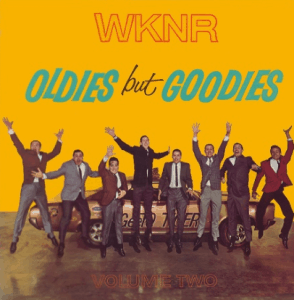 What Bob calls, “intelligent flexibility” (Air Check) rewarded creativity. Gary Stevens’ WollyBurger, J. Michael Wilson’s Rodney the Rodent. Scott Regen’s Melissa Mulch and the parade of characters that Tom Ryan created for Dick Purtan. All of these ideas were the creations of these artists. Scott Regen got “The Burger Club” and “The Groove Yard” ideas directly from listeners and implemented them almost immediately. When the Beatles and the Monkees came to town, Keener was the brand most associated with their appearances. And Scott Regen’s connections with Motown are legendary. That’s him saying, “This is the police…” on R. Dean Taylor’s “Indiana Wants Me”.
What Bob calls, “intelligent flexibility” (Air Check) rewarded creativity. Gary Stevens’ WollyBurger, J. Michael Wilson’s Rodney the Rodent. Scott Regen’s Melissa Mulch and the parade of characters that Tom Ryan created for Dick Purtan. All of these ideas were the creations of these artists. Scott Regen got “The Burger Club” and “The Groove Yard” ideas directly from listeners and implemented them almost immediately. When the Beatles and the Monkees came to town, Keener was the brand most associated with their appearances. And Scott Regen’s connections with Motown are legendary. That’s him saying, “This is the police…” on R. Dean Taylor’s “Indiana Wants Me”.
There is a famous Bob Green aircheck where he stopped the show to talk a kid into staying in school (on the air) when the listener called to make a request. Bob ran into that person at a recent radio reunion. He’s now a CEO.
Some things didn’t work. Keener’s “Vote For Your Favorite School Principal” backfired big time. But the man behind the curtain, Frank Maruca, was a buffer between the artists and station manager, Walter Paterson, an old school guy who didn’t get the vibe that was going on. And the team was allowed to innovate.
The result was a listener perception of a close, personal relationship with people who informed, entertained and cared about us. People who knew their subject cold. People who were in a constant state of experimentation. People who adjusted the format, sometimes on the fly, to attend to what the listener needed right now.
That does not exist today. With a few notable exceptions, my kids see broadcasting as nothing more than an iPod rotation with 18 minutes of commercials an hour. There is now a generation who doesn’t have the tradition of listening to terrestrial radio and as it becomes easier to connect smart devices to the dashboard, Pandora, Spotify and iTunes will have the wide side of the field. Despite the industry hype, most broadcasters won’t. You’ve done a great job of articulating the path to redemption, Fred. It’s about the people. Radio needs to engage where they are – read: mobile, blogs, Facebook, apps, and most importantly, in person. Radio needs to listen to what its customers want and provide it in a hyper-local, interactive, personal way. There is no incentive to do this when there are virtual market monopolies/duopolies that prioritize shareholder return over entrepreneurial risk. When you have a personnel
blood bath every Christmas, it’s a sign that you have lost your mojo.
Jobs understood this. So do Zuckerberg and Westergren. Our guys are riding the dinosaur into the tar pits.
There are some smart people who head these broadcasting companies. They craft cogent arguments for the decisions they make. They believe they have the formula for survival figured out. An unsinkable medium that will continue to deliver customers to the bank.
The guy who designed the Titanic thought he had the formula, too.
I changed barbers recently. These guys have been cutting hair for 30 years and grew up here. About 5 minutes into my first clipping, one of them made the connection that I “used to be on WVIC.”
 “We came to see you at Roller World,” owner Kevin Willett said. “You spoke at our school. I still have an album you signed. My daughter is on the radio at Olivet College and uses the same sign-off you used to use. I taught it to her.”
“We came to see you at Roller World,” owner Kevin Willett said. “You spoke at our school. I still have an album you signed. My daughter is on the radio at Olivet College and uses the same sign-off you used to use. I taught it to her.”
I haven’t been on the air regularly in over 20 years.
“Touching someone, making a difference, giving someone a story to tell,” this is what friends do. Radio still has the ability to be that friend, to inspire, even mentor listeners, developing lifelong connections along the way… if it can figure out how to matter more.
The Keener Towers Come Down
 Every time our family would make the drive from Ann Arbor toward Detroit, there were two things we looked for: The Uniroyal Tire and the WKNR tower site. I learned later about how the highly directional array allowed 1310 kc to be inserted into the Detroit radio market, how after dark, Keener literally disappeared from certain parts of the city, and how underpowered this radio station truly was.
Every time our family would make the drive from Ann Arbor toward Detroit, there were two things we looked for: The Uniroyal Tire and the WKNR tower site. I learned later about how the highly directional array allowed 1310 kc to be inserted into the Detroit radio market, how after dark, Keener literally disappeared from certain parts of the city, and how underpowered this radio station truly was.
Starting on Halloween night, 1963, none of the technical stuff mattered. The WKNR brand literally overwhelmed anybody else who tried to compete in the rock radio business. Such was the talent and the philosophy that Bob Green calls “intelligent flexibility”, that better funded operations didn’t stand a chance.
For those of us who loved Keener, those years were Camelot, where a radio station provided the sound track of our lives and the Key Men of Music were our best friends. Important dates were defined by the songs Keener played. The most memorable concerts had a Keener connection. And the blue collar energy of a hundred different Michigan garage bands blended seamlessly with Berry Gordy’s Motown Sound to define Michigan Rock for the entire world.
The brightest stars shine but briefly. Such was Keener’s story. But the long comet tail of men, women and music still glows in our minds. It was a Keener alum, Steve Schram, who helped guide the former WKNR FM frequency to renewed dominance in the midst of the consolidation maelstrom. Dick Purtan became his own brand, the ringmaster of the longest running, most successful morning show in Detroit radio history. Pat St. John and Jim Kerr, Keener’s Robin Stone, have been on the air in New York almost non-stop since their Detroit days. WKNR legends like Philip Nye and Bill Bonds made indelible impressions on other media. And the people who migrated behind the scenes, like the inestimable Jim Brooker, made key contributions to an ever evolving industry.
Facebook provides a place for those who remember WKNR to congregate (Visit out Keener 13 page there). And the airchecks, memorabilia and memories I continue to receive five decades after WKNR was born is continuing testament to what the Keener experience meant to so many.
15001 Michigan Avenue is no longer a radio studio. And as of December 31, 2012, the wire and steel that radiated the Keener sound into the ether will be no more.
But for those of us who were there, WKNR will always be part of who we are. Long live Keener!
The last moments. With thanks to Joe Kirklin for the video.
Keener’s Secret Side-Men
 Who are your favorite Keener Rock and Roll secret side men? Acts like Glenn Campbell and Leon Russell labored on other people’s hits before coming into their own. In fact, many of the great acts that charted on the WKNR Music Guide benefited from some legendary side-men. The Wrecking Crew reminded me today about Louie Shelton, the axe ace who added class to a ton of hit records, including the Jackson 5’s “ABC” and “I Want You Back”, Seals & Croft’s “Summer Breeze” and “Low Down” by Boz Scaggs. And that’s Louis played those amazing Latin guitar licks on the Monkee’s “Valerie” as heard on Keener in March of 1968. Boyce and Hart wrote it and Davy does a pretty good job on the vocals.
Who are your favorite Keener Rock and Roll secret side men? Acts like Glenn Campbell and Leon Russell labored on other people’s hits before coming into their own. In fact, many of the great acts that charted on the WKNR Music Guide benefited from some legendary side-men. The Wrecking Crew reminded me today about Louie Shelton, the axe ace who added class to a ton of hit records, including the Jackson 5’s “ABC” and “I Want You Back”, Seals & Croft’s “Summer Breeze” and “Low Down” by Boz Scaggs. And that’s Louis played those amazing Latin guitar licks on the Monkee’s “Valerie” as heard on Keener in March of 1968. Boyce and Hart wrote it and Davy does a pretty good job on the vocals.
http://www.youtube.com/watch?v=MJw0qpqIONQ
Alice Restaurant
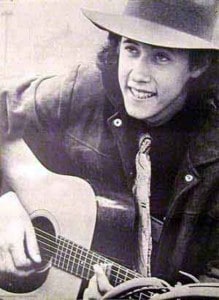 In 1967, Arlo Guthrie released his debut album. The 18 minute cut on side one told the story of Arlo’s adventures one Thanksgiving in Stockbridge, Massachusetts. Alice’s Restaurant became a counter culture anthem that launched the son of the legendary Woodie Guthrie to the upper echelons of 60s rock and roll culture. The 1969 Arthur Penn film cemented to story into our consciousness.
In 1967, Arlo Guthrie released his debut album. The 18 minute cut on side one told the story of Arlo’s adventures one Thanksgiving in Stockbridge, Massachusetts. Alice’s Restaurant became a counter culture anthem that launched the son of the legendary Woodie Guthrie to the upper echelons of 60s rock and roll culture. The 1969 Arthur Penn film cemented to story into our consciousness.
Arlo’s other notable film appearance came in 1970, documenting his performance at Woodstock during the summer of 1969. But he would only chart on the Top 40 with a Steve Goodman penned tale about riding the rails on the famous Illinois Central’s City of New Orleans. That album was Hobo’s Lullaby, a collection on the Warner Reprise label that made it’s debut right around the time that WKNR faded into history.
Every Thanksgiving, those of us who still own the LP dig it out of the closet, dust it off, pop it on the turntable and head back to a time when being a litter bug could get you into real trouble.
The JFK Assassination Remembered
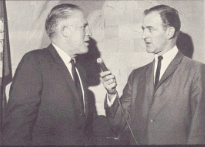 On November 20, 2004 Keener13.com presented a podcast detailing the Assassination of John F. Kennedy, how radio covered the news and how the brand new WKNR became an all-news station during that staggering moment in American History.
On November 20, 2004 Keener13.com presented a podcast detailing the Assassination of John F. Kennedy, how radio covered the news and how the brand new WKNR became an all-news station during that staggering moment in American History.
We begin with a rare logger tape from KLIF in Dallas. Keener fan and Kennedy scholar Jim Feliciano connected us with this one-of-a-kind historical record. Rex Jones, Gary DeLaune, Joe Long and Gordon McLendon (yep, that Gordon McLendon – one of the fathers of Top 40 radio) described the rapidly unfolding events. Then we fast-forward one year later to the WKNR documentary about that day, produced by Bob Green and Philip Nye (seen at left interviewing Michigan Governor George Romney) for WKNR News. It is said that television news came of age on that day, 41 years ago. But for many, radio was still a trusted source of timely, if not always accurate information. For those who depended on their radios during Hurricane Sandy, that’s still very much the case.
Listen to the program. 31 Minutes 11.1MB MP3
MC5 Remembered
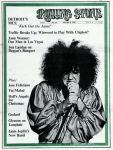 As the 60s crossed into the 70s, the Motor City 5 defined fire breathing, flame throwing rock and roll in Detroit. With Fred “Sonic” Smith and Wayne Kramer on the axes, Michael Davis on base, Dennis Thompson at the drums and the megawatt voice of singer Rob Tyner at the microphone, the band was the essence of proto-punk, rattling the rafters at the Grande and pushing the edge of the envelope everywhere they went.
As the 60s crossed into the 70s, the Motor City 5 defined fire breathing, flame throwing rock and roll in Detroit. With Fred “Sonic” Smith and Wayne Kramer on the axes, Michael Davis on base, Dennis Thompson at the drums and the megawatt voice of singer Rob Tyner at the microphone, the band was the essence of proto-punk, rattling the rafters at the Grande and pushing the edge of the envelope everywhere they went.
Such was their magnetism that they took over the cover of Rolling Stone magazine in January of 1969, even before the release of their debut album. In the magazine’s profile of the band, Eric Ehrmann, then a student at Miami of Ohio, called them “the next rock and roll superheroes“, the act that would symbolize the migration of musical revolution from San Francisco to Detroit. To hear the MC5 in live performance was like touching a raw nerve with a cattle prod. Rock journalist Robert Bixby famously called it “a catastrophic force of nature the band was barely able to control.”
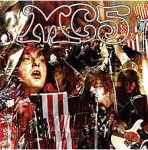 For those of us who grew up in Ann Arbor during the 5’s reign, the fact that you had to be 18 to buy their album at Jeep Holland‘s Discount records made them all the more alluring. Every Ann Arbor garage band had at least one MC5 song in our repertoire and we all dared one another to launch our version of “Kick Out The Jams” with Rob’s signature introduction.
For those of us who grew up in Ann Arbor during the 5’s reign, the fact that you had to be 18 to buy their album at Jeep Holland‘s Discount records made them all the more alluring. Every Ann Arbor garage band had at least one MC5 song in our repertoire and we all dared one another to launch our version of “Kick Out The Jams” with Rob’s signature introduction.
Then as now, rock and roll was a dangerous profession. Today, only Thompson and Kramer survive. But thanks to YouTube and MP3s, the MC5 experience is just as visceral and earthshaking today as it was during their brief prime. As Blade Runner character Eldon Tyrell might have said. “The light that burns twice as bright burns for half as long – and you have burned so very, very brightly.”
Wayne Fontana
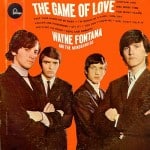 Happy birthday to Glyn Geoffrey Ellis, born on this date, 28 October 1945, in Manchester, Lancashire. You know him as Wayne Fontana, a name that was inspired by Elvis’ drummer, D.J. Fontana. It was a coincidence that he was signed to Fontana Records.
Happy birthday to Glyn Geoffrey Ellis, born on this date, 28 October 1945, in Manchester, Lancashire. You know him as Wayne Fontana, a name that was inspired by Elvis’ drummer, D.J. Fontana. It was a coincidence that he was signed to Fontana Records.
His biggest hit with his band The Mindbenders was “The Game Of Love” which peaked at number 4 on the WKNR Music Guide in March of 1965. The Mindbenders charted again on Keener in The Spring of 1966 with “Groovy Kind of Love“. By then, Wayne Fontana had left the band in pursuit of a solo career.
After his share of ups and downs, Wayne Fontana continues to tour in both the UK and the US.
http://youtu.be/0pLZwUSDtYU
Keener Uncut
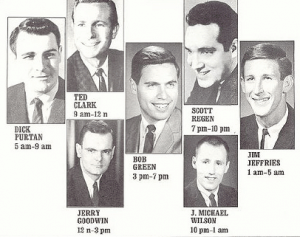 What did Swingin Sweeney, Bob Green, J. Michael Wilson, Dick Purtain, Scott Regen and Bill Phillips sound like on the air?
What did Swingin Sweeney, Bob Green, J. Michael Wilson, Dick Purtain, Scott Regen and Bill Phillips sound like on the air?
You’ll find a ton of examples here at Keener13.com. But few recordings exist of Keener Uncut, the jocks and the songs they played, without edits. Back in February of 2005, we put together 30 minutes of uncut WKNR, featuring all of the above noted Key Men of Music.
For those of us who lived it, the memories will come flooding back. For those who never knew about Keener, you’ll quickly see why even the songs at the bottom of the WKNR Music Guide sounded great.
Return with us now, to those thrilling days of yesteryear with this Keener Uncut Encore.
Listen to Keener Uncut 29mb mp3

